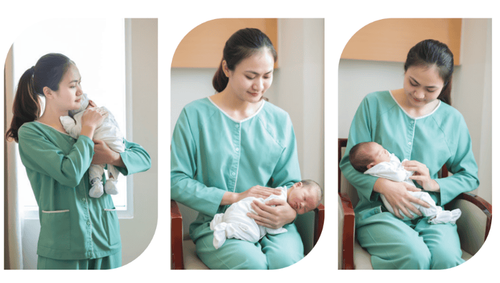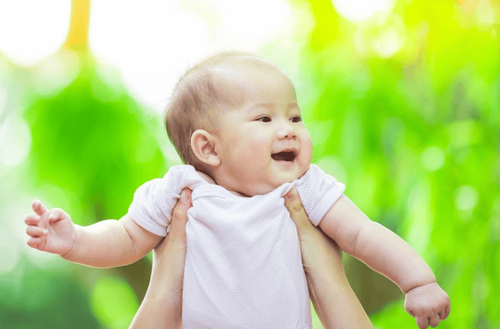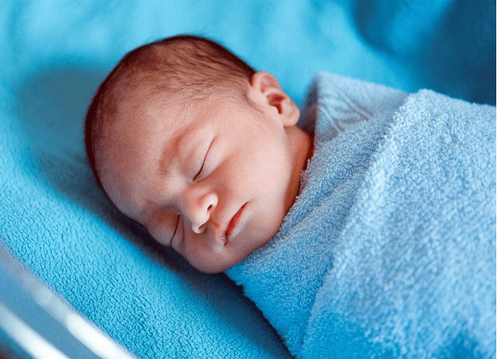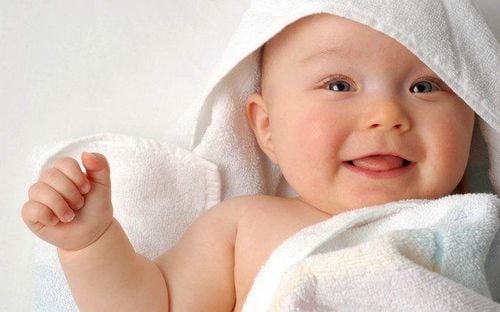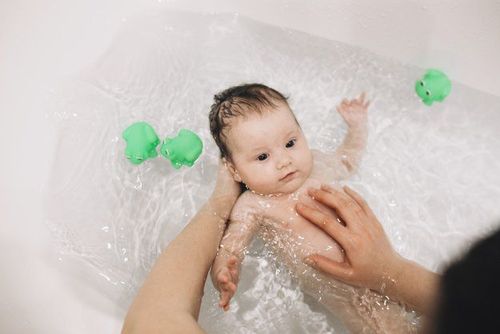This is an automatically translated article.
The article is professionally consulted by Master, Doctor Phan Thi Cam Van - Neonatologist - Department of Pediatrics - Neonatology - Vinmec Danang International General Hospital. He has 7 years of experience as a Resident Doctor and a Pediatrician - Neonatal Doctor at Hue Central Hospital and Hue University Hospital of Medicine and Pharmacy. Her strength is in the treatment of Pediatric diseases of Respiratory, Digestive, infectious diseases, newborn care and treatment, neonatal resuscitation.After the birth of a baby crying, the newborn will get out of the mother's body and have to adapt to the outside environment, learn to breathe, feed on its own and cope with hot and cold weather. .. In order to protect health and comprehensive development, it is very important to take care of a newborn until full term, there are many issues that parents need to pay attention to.
1. Instructions for taking care of babies in the first 7 days
The first 7 days after birth is quite an important time for a newborn less than a month because this is still the perinatal period of the baby and the possibility of the baby dying if not properly cared for is very high. (occupy 50%). During this period, the child's cranial nerves are inhibited because of a lot of sleep, the child only wakes up when hungry or wet diapers, so parents need special attention and care.The way to take care of an infant under 1 month old is to keep the child's body warm, if the child is cold or hypothermic for a long time, it will create conditions for bacteria to attack the child and cause many diseases. If there are no problems with the mother and the baby after birth, it is best to let the child lie with the mother, this helps to connect the motherhood, and helps to transmit the warmth from the mother to the child and the mother can Observe children at all times, promptly handle when unexpected problems occur.
When in the womb, the baby is provided with nutrients continuously from the mother's blood through the placenta, so when born, the baby is prone to hunger and cold, so it is necessary to have enough energy to warm the body and fight with the weather outside. When taking care of an infant under 1 week old, it is important to remember that the child has a very high need to eat, needs to be breastfed as soon as possible after birth, so the mother must meet the child's needs as soon as the baby needs it, not follow a certain time.
Colostrum is the main and best food for the development of babies during this period. Science has proven that IgA in breast milk for the first 7 days contains thousands of times higher levels than normal milk and up to 4,000 white blood cells in 1cm3 of colostrum can help babies destroy intestinal bacteria. Therefore, mothers should not discard colostrum, but make full use of it to feed the baby. Newborns less than a month old, if given colostrum right after birth, the rate of pneumonia and diarrhea will be very low.
Some normal physiological manifestations are also very common in infants less than a month old such as: passing meconium, dark green or odorless, thick stools... However, if it is more than 2 days, no meconium stools, weight loss or jaundice, frequent choking when feeding, shortness of breath, cyanosis, stiff jaw, crying a lot, lethargy is not normal, parents need to take the child to the hospital The hospital checks the health status for timely treatment. In the case of a child's head with a serous tumor, it is necessary to monitor, not aspirate, because it may cause the child to become infected with dangerous bacteria.
In addition, when taking care of an infant under 1 week old with low birth weight or premature but no abnormal signs, it is necessary to follow up at a medical facility until the doctor agrees to discharge. When returning home, it is necessary to monitor and take care of the child carefully.
Trắc nghiệm: các chỉ số cần chú ý về sự phát triển thể chất của trẻ
Chiều cao, cân nặng của bé ở từng giai đoạn nên là bao nhiêu là bình thường, bao nhiêu là bất thường? Cùng ThS.BS Ma Văn Thấm điểm lại xem bạn đã nắm được các chỉ số phát triển thể chất của bé chưa nhé!The following content is prepared under supervision of Thạc sĩ, Bác sĩ y khoa, Ma Văn Thấm , Nhi , Phòng khám Đa khoa Quốc tế Vinmec Dương Đông(Phú Quốc)
2. How to take care of a newborn until full month
The perinatal period lasts until the baby is 28 days old, during this period, the risks of harm to the baby will be reduced if the parents take proper care, so learn how to take care of the newborn. Giving birth under 1 month old is a must for any parent.2.1 Taking care of babies when eating When they are new born, the baby's eating reflex is very immature, so the support from the mother is very necessary, if the baby is not fed properly, it can cause the baby to vomit milk. Vomiting is very dangerous. In addition to performing the correct operation when feeding, parents should limit the child's vomiting by holding the child upright for a few minutes and cupping his hand to pat the child's back after feeding; When sleeping, babies should be placed with their heads slightly higher or on their sides to reduce the risk of aspiration, absolutely do not let infants less than a month sleep on their stomachs.
Science has proven, breast milk is the best food for the health and development of babies, so if you have enough milk, make sure to breastfeed your baby until the baby is 1 year old. To have an abundant milk supply, mothers should eat many meals, eat enough nutrients and drink lots of water every day. In addition, breastfeeding a lot is also a way to stimulate more milk.
2.2 Care of the umbilical cord and bathing the baby Newborns less than a month old are very susceptible to neonatal infections through the umbilical cord, so daily umbilical cord care is a necessity that parents must perform. . After bathing the baby, clean the umbilical cord with physiological saline and dry it, absolutely do not apply any substance to the baby's navel, if you want to quickly fall off the umbilical cord, let the umbilical cord clear, should not be covered. again.
Before bathing an infant less than a month, parents should prepare enough clothes, diapers, diapers, wipes, towels, bath water, eye drops, nose drops... to help the child clean and Warm up your body right after taking a shower. The place to bathe the baby must be closed so that the wind can't get in. If you don't use cool leaves to bathe your baby, then you should choose a special soap for babies with natural ingredients and remember to dry the baby before putting on clothes. If the weather is winter, it is not necessary to bathe the child every day.

2.3 Wearing hats and swaddling children properly Many mothers are afraid of cold children, so they wear hats continuously regardless of day and night, whether the weather is hot or cold, but this habit is absolutely not good. Newborns less than a month old often lose heat through the scalp, so mothers should pay attention to the back of the baby's nape, if the weather is hot, at night or when going out, just put on a hat to cover the fontanelle, while indoors Let the baby's head air out. Newborn babies' bodies cannot regulate their own body temperature, so wearing a tight-fitting hat will make them sweat a lot, they will itch and cry, in many cases will increase their body temperature and cause them to have a high fever.
Many people think that swaddling tight will help babies not be startled and sleep better, less fussy, but scientific research has proven this to be completely wrong. Tight swaddling has the risk of forcing the child's hip joint to straighten and forward, causing the child's leg to be misaligned, tight, hot, uncomfortable....
2.4 Skin care, eye care, tongue and nose for babies In taking care of babies under 1 month old, special attention should be paid to the baby's immature skin and eyes. The skin and eye care as well as the selection of skin care products need to adhere to the following principles:
Do not let your baby's skin come into contact with harsh soaps, cosmetics with irritants; It is necessary to change the diaper as soon as the diaper is wet and use gentle products to fight the irritation (feces, urine...) that makes the baby's skin red; Always keep the baby's skin with proper moisture; Do not let harmful chemicals affect children's eyes. If the child has a lot of tears and discharge in the first days after birth, please clean the baby's eyes with physiological saline daily; Use a separate towel to wipe your baby's face. In addition, parts such as the nose and tongue also need to be cleaned daily. Mothers can use physiological saline to clean and clean the tongue to reduce the number of harmful organisms in the mouth and help children feel better.
2.5 Some other notes How to take care of babies under 1 month old is indispensable to measure the baby's temperature daily. The health of newborns is very sensitive, so prepare a thermometer to measure body temperature whenever your baby is warm or cold. The normal temperature of a newborn is between 36.5 and 37. degrees C.
If the temperature is higher than 37.5 degrees C, the child should wear loose, ventilated clothes and remove blankets for the child, breastfeed more; If the temperature is higher than 38 degrees Celsius, it means that the child has a fever, if cooling and fever reduction does not work, take the child to a medical facility for examination and treatment immediately. A special thing to note when taking care of an infant under 1 month old that parents must definitely remember is that the infant's body is very weak and has low resistance, so it is absolutely forbidden to let others hug or kiss you. into the child's mouth, this will increase the risk of infection and harmful germs entering, causing illness for the child.
Caring for a baby less than a month old can be overwhelming for families welcoming a baby for the first time. However, parents and other relatives of the baby should try to learn how to take care of the child properly, because the care in these early days will greatly affect the development of the baby later.
As a key area of Vinmec Health system, Pediatrics Department always brings satisfaction to customers and is highly appreciated by industry experts with:
Gathering a team of top doctors and nurses in Pediatrics : consists of leading experts with high professional qualifications (professors, associate professors, doctorates, masters), experienced, worked at major hospitals such as Bach Mai, 108.. Doctors All doctors are well-trained, professional, conscientious, knowledgeable about young psychology. In addition to domestic pediatric specialists, the Department of Pediatrics also has the participation of foreign experts (Japan, Singapore, Australia, USA) who are always pioneers in applying the latest and most effective treatment regimens. . Comprehensive services: In the field of Pediatrics, Vinmec provides a series of continuous medical examination and treatment services from Newborn to Pediatric and Vaccine,... according to international standards to help parents take care of their baby's health from birth to childhood. from birth to adulthood Specialized techniques: Vinmec has successfully deployed many specialized techniques to make the treatment of difficult diseases in Pediatrics more effective: neurosurgery - skull surgery, stem cell transplantation. blood in cancer treatment. Professional care: In addition to understanding children's psychology, Vinmec also pays special attention to the children's play space, helping them to have fun and get used to the hospital's environment, cooperate in treatment, improve the efficiency of medical treatment.
Please dial HOTLINE for more information or register for an appointment HERE. Download MyVinmec app to make appointments faster and to manage your bookings easily.






